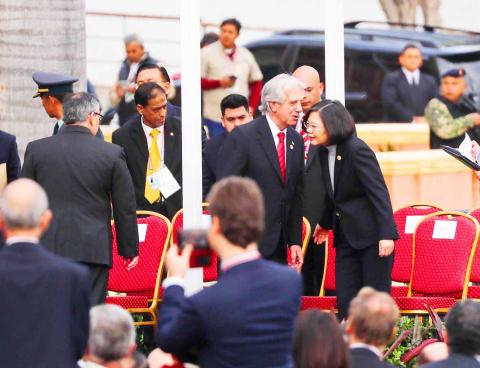Uruguay’s decision to halt visa-free entry for Taiwanese from Wednesday was due to pressure from Beijing, a source said yesterday.
The announcement by Uruguay, which ended diplomatic ties with Taiwan in 1988, was unexpected, the source said.
Chinese General Administration of Customs Minister Ni Yue-feng (倪岳峰) on Monday visited Uruguay, where he reportedly met with Uruguayan Minister of Foreign Affairs Rodolfo Nin Novoa as the two nations celebrated the 30th anniversary of formal diplomatic ties, the source said.

Photo: CNA
However, the Ministry of Foreign Affairs in Taipei yesterday cited technical issues for Uruguay’s decision.
Uruguay halted the preferential treatment for Taiwanese because its online e-visa application system is still being developed, the ministry said.
Until further notice, Taiwanese would have to apply for a visa at the Uruguayan embassy in Japan, ministry spokesman Andrew Lee (李憲章) said.
The ministry said that it would continue to approach the Uruguayan government and strive to have the relevant procedures completed as soon as possible so that Taiwanese could again enjoy the convenience of visa-free entry into Uruguay.
Uruguay began offering visa-free entry for up to 90 days on Oct. 19, making it the 169th nation at the time to offer Taiwanese preferential visa treatment.
The ministry had previously said that visa-free access was granted due to steps taken by the Taipei Commercial and Cultural Office in Argentina, which also handles Uruguayan affairs.
Additional reporting by CNA

AIR SUPPORT: The Ministry of National Defense thanked the US for the delivery, adding that it was an indicator of the White House’s commitment to the Taiwan Relations Act Deputy Minister of National Defense Po Horng-huei (柏鴻輝) and Representative to the US Alexander Yui on Friday attended a delivery ceremony for the first of Taiwan’s long-awaited 66 F-16C/D Block 70 jets at a Lockheed Martin Corp factory in Greenville, South Carolina. “We are so proud to be the global home of the F-16 and to support Taiwan’s air defense capabilities,” US Representative William Timmons wrote on X, alongside a photograph of Taiwanese and US officials at the event. The F-16C/D Block 70 jets Taiwan ordered have the same capabilities as aircraft that had been upgraded to F-16Vs. The batch of Lockheed Martin

GRIDLOCK: The National Fire Agency’s Special Search and Rescue team is on standby to travel to the countries to help out with the rescue effort A powerful earthquake rocked Myanmar and neighboring Thailand yesterday, killing at least three people in Bangkok and burying dozens when a high-rise building under construction collapsed. Footage shared on social media from Myanmar’s second-largest city showed widespread destruction, raising fears that many were trapped under the rubble or killed. The magnitude 7.7 earthquake, with an epicenter near Mandalay in Myanmar, struck at midday and was followed by a strong magnitude 6.4 aftershock. The extent of death, injury and destruction — especially in Myanmar, which is embroiled in a civil war and where information is tightly controlled at the best of times —

Taiwan was ranked the fourth-safest country in the world with a score of 82.9, trailing only Andorra, the United Arab Emirates and Qatar in Numbeo’s Safety Index by Country report. Taiwan’s score improved by 0.1 points compared with last year’s mid-year report, which had Taiwan fourth with a score of 82.8. However, both scores were lower than in last year’s first review, when Taiwan scored 83.3, and are a long way from when Taiwan was named the second-safest country in the world in 2021, scoring 84.8. Taiwan ranked higher than Singapore in ninth with a score of 77.4 and Japan in 10th with

China's military today said it began joint army, navy and rocket force exercises around Taiwan to "serve as a stern warning and powerful deterrent against Taiwanese independence," calling President William Lai (賴清德) a "parasite." The exercises come after Lai called Beijing a "foreign hostile force" last month. More than 10 Chinese military ships approached close to Taiwan's 24 nautical mile (44.4km) contiguous zone this morning and Taiwan sent its own warships to respond, two senior Taiwanese officials said. Taiwan has not yet detected any live fire by the Chinese military so far, one of the officials said. The drills took place after US Secretary